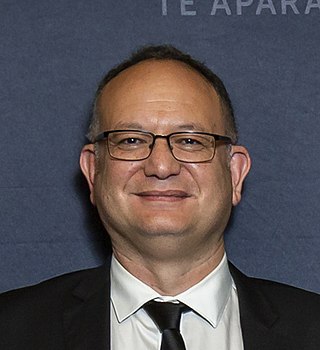
The Royal Society Te Apārangi is a not-for-profit body in New Zealand providing funding and policy advice in the fields of sciences and the humanities. These fundings are provided on behalf of the New Zealand Ministry of Business, Innovation and Employment.

Te Ahukaramū Charles Royal is a New Zealand musician, academic, and Māori music revivalist. He is of Ngāti Whanaunga, Ngāti Raukawa, Ngāti Tamaterā, and Ngā Puhi descent.

Ngahuia Te Awekotuku is a New Zealand academic specialising in Māori cultural issues and a lesbian activist. In 1972, she was famously denied a visa to visit the United States on the basis of her sexuality.
Judy Anne Brown is a New Zealand accountancy academic. She is currently a full professor at the Victoria University of Wellington. In 2024, she was elected a Fellow of the Royal Society Te Apārangi.
Jarrod McKenzie Haar is a New Zealand organisational psychology academic, are Māori, of Ngati Maniapoto and Ngati Mahuta descent and as of 2019 is a full professor at the Auckland University of Technology. He is a Fellow of the Royal Society Te Apārangi.
Tara G McAllister is a New Zealand freshwater ecology academic and is associated with Te Pūnaha Matatini at the University of Auckland. She is a Māori of Te Aitanga ā Māhaki, Ngāti Porou, and European descent.

Margaret Louise Furey is a New Zealand archaeologist. Formerly a consulting archaeologist, she is now Curator of Archaeology at Auckland War Memorial Museum.
Kura Paul-Burke is a New Zealand Māori marine scientist, and is the first woman Māori professor of marine science at the University of Waikato. Her research focuses on mātauranga Māori and aquaculture.
Joanna Claire Mossop is a New Zealand academic, and is a full professor at Victoria University of Wellington, specialising in the law of the sea, including conservation law, and laws outside national jurisdictions.
Catherine Mary Reid is a New Zealand paleontologist, and is a full professor at the University of Canterbury, specialising in palaeogeography of waterways and the evolution and ecology of bryozoans.
Caroline E. Foster is a New Zealand law professor at the University of Auckland, specialising in international law and the law of the sea, compliance and dispute settlement.

Karen Marie Nairn is a New Zealand academic, and is a full professor of education at the University of Otago, specialising in youth-centred research.
Eva Marie Collins is an American–New Zealand academic, and is a full professor at the University of Waikato, specialising in business sustainability and the circular economy.

Catriona M. O. Macinnis-Ng is a New Zealand ecologist, and is a full professor at the University of Auckland, specialising in the effects of climate change, especially drought, on plants. She has been awarded a Rutherford Discovery Fellowship, the Roger Slack Award, and the Miriam Dell Award for Excellence in Science Mentoring.
Maren Wellenreuther is a German–New Zealand marine scientist, and is a full professor at the University of Auckland, specialising in the development of indigenous fish aquaculture.

Christine M. Kenney is a New Zealand sociologist, and is a Distinguished Professor of Disaster Risk Reduction at Massey University. She is the first Māori woman to lead a UN international science caucus. In 2024 Kenney was elected to the Council of the Royal Society Te Apārangi.
Bridgette Masters-Awatere is a New Zealand academic and practising psychologist, and is a full professor at the University of Waikato, specialising in Māori psychology and health.
Karen Elizabeth Waldie is a Canadian–New Zealand academic psychologist, and is a full professor at the University of Auckland, specialising in understanding the causes of neurodiversity such as autism, ADHD, dyslexia and dyscalculia.
Erica Hinckson is a New Zealand academic, and is a full professor at the Auckland University of Technology (AUT). She is interested in how the built environment affects physical activity, and how to use approaches such as citizen science and participatory research to achieve large-scale change.
Barbara June Hayden is a New Zealand marine biologist, and is Chief Scientist at the National Institute of Water and Atmospheric Research (NIWA), specialising in marine biosecurity and aquaculture. In 2019 she was elected a Companion of the Royal Society Te Apārangi and awarded the New Zealand Marine Sciences Society Award.






